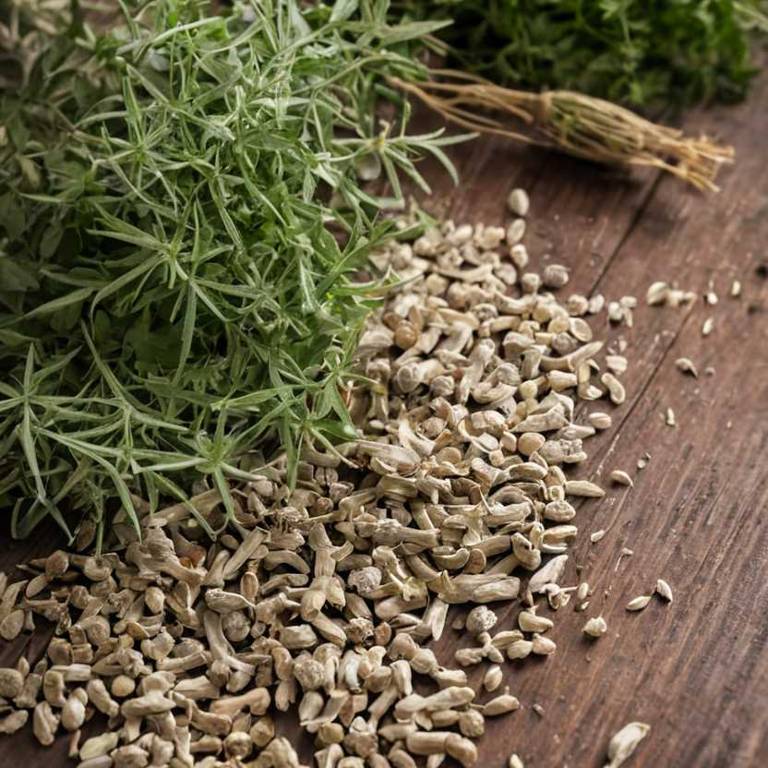Java Tea (Orthosiphon aristata)
Java Tea (Orthosiphon aristata) is a member of the Labiatae family, traditionally used in various regions for its diuretic properties and as a treatment for kidney stones. The plant parts, including leaves and roots, have been utilized in traditional practices, often prepared as a tea or decoction.
Botanical Classification and Taxonomy
Java Tea, or Orthosiphon aristata, belongs to the family Lamiaceae. Native to Southeast Asia, it is commonly found in tropical regions. The plant is a shrub with serrated leaves and small, fragrant flowers.
Taxonomic Hierarchy
Java Tea, or Orthosiphon aristata, belongs to the kingdom Plantae, phylum Angiosperms, class Eudicots, order Lamiales, family Scrophulariaceae, genus Orthosiphon, and species aristata. This classification places it within the broader group of flowering plants known for their medicinal properties.
Geographic Distribution
Java Tea is native to Southeast Asia, particularly Indonesia, Malaysia, and Thailand. It has been introduced to other tropical regions, where it is used in traditional medicine for its diuretic and anti-inflammatory properties.
Morphological Characteristics
Java Tea, or Orthosiphon aristata, is a shrub with slender stems and opposite leaves. Its small, tubular flowers are typically white or pale pink, and it produces small, three-lobed fruits. The plant has a distinctive aromatic scent and is commonly found in tropical regions.
- Class:
- Subclass:
- Order:
- Family: Labiatae
Active Compounds and Chemical Constituents
Java Tea contains various bioactive compounds such as saponins, tannins, and flavonoids. These phytochemicals contribute to its medicinal properties and are responsible for its therapeutic effects in traditional herbal medicine.
Identification of Key Active Compounds
Java Tea contains compounds like saponins, flavonoids, and orthosiphonates. These are grouped into categories such as glycosides and phenolic compounds, contributing to its medicinal properties.
Pharmacological Actions and Mechanisms
Java Tea contains compounds with diuretic, antioxidant, and anti-inflammatory properties. These effects are mediated through interactions with renal tubules, free radicals, and inflammatory pathways. The active constituents modulate ion transport and reduce oxidative stress in cellular systems.
Therapeutic Uses and Medical Applications
Java Tea, or Orthosiphon aristata, has been traditionally used in Southeast Asia for its diuretic properties. In modern medicine, it is used to treat kidney stones, hypertension, and urinary tract infections. It is commonly prepared as a tea by steeping the dried leaves in hot water.
Historical, Traditional, and Cultural Use
Java Tea, or Orthosiphon aristata, has a long history in traditional medicine, particularly in Southeast Asia. It has been used for centuries to support kidney health and as a diuretic. In traditional Malay and Indonesian medicine, it is often prepared as a herbal tea to aid in detoxification and urinary function.
Diseases and Conditions Treated
Java Tea is traditionally used to treat kidney stones, urinary tract infections, and hypertension. It is also believed to aid in reducing inflammation and supporting kidney function. Scientific studies suggest it may help in managing diabetes and improving overall urinary health.
Preparation Methods and Forms
Java Tea is traditionally prepared by boiling the leaves in water, though it is also available in dried leaf form or as a supplement. Modern methods include using it in tea bags or as an extract, offering convenience while preserving its medicinal properties.
Cultivation and Harvesting
Java Tea is typically grown in tropical climates with well-drained soil and full sunlight. Organic cultivation is preferred to maintain its medicinal properties. Harvesting occurs during the dry season, with leaves and stems carefully hand-picked to preserve potency. Proper drying and storage in airtight containers ensure quality retention.
Cultivation Methods
Java Tea is traditionally grown in tropical climates with well-drained soil and partial shade. Modern methods use controlled environments to optimize growth. It can be propagated through seeds, stem cuttings, and sometimes grafting, with cuttings being the most common and reliable method.
Growth Conditions
Java Tea thrives in temperatures between 20-30°C with moderate humidity. It requires bright, indirect light and well-draining soil with a pH of 5.5-6.5. It prefers slightly acidic to neutral soil rich in organic matter. Growing in elevated areas with gentle slopes aids drainage and reduces risk of root rot.
Harvesting Practices
Java Tea is best harvested during the dry season to ensure maximum potency. The leaves and stems are primarily collected, with minimal damage achieved through careful pruning. Traditional tools like sickles and hand shears are used to minimize plant stress and promote regrowth.
Safety, Toxicology, and Side Effects
Java Tea is generally considered safe when used in moderate amounts, but may cause gastrointestinal discomfort in some individuals. There are no well-documented toxic reactions or severe allergies associated with its use. It is advisable to consult a healthcare provider before combining it with other medications due to potential interactions.
General Safety
Java Tea is generally safe when used in typical herbal amounts. However, pregnant and breastfeeding women should avoid it due to potential risks. People with kidney issues should also consult a healthcare provider before use.
Side Effects
Java Tea may cause mild gastrointestinal discomfort such as nausea or stomach upset. Rarely, it may lead to allergic reactions or skin rashes. It can interact with medications like diuretics or blood pressure drugs. Long-term use might contribute to electrolyte imbalances or kidney issues in susceptible individuals.
Toxicological Profile
Java Tea contains toxic compounds such as saponins and oxalates, which can cause gastrointestinal distress and kidney damage if consumed in large quantities. These compounds are naturally present in the plant and contribute to its potential risks when used improperly in herbal medicine.